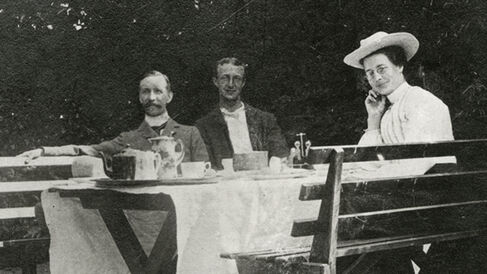The coming of Hopkins

Before the end of the nineteenth century, Arthur Sheridan Lea had begun to carry out research in Cambridge on chemical physiology and was teaching the first courses on metabolism and digestion, which started in 1882. By the 1890s Michael Foster was also working as a chemical physiologist in the Physiological Laboratory (located at the site now occupied by the David Attenborough Building on Corn Exchange Street), and it was he who invited Frederick Gowland Hopkins, in 1898, to come to Cambridge and develop that subject in his laboratory.
Hopkins was born on the 20th June 1861 in Eastbourne. His father died when he was very young, and in 1871 he moved with his mother to Enfield and attended the City of London School. Having published his first paper at the age of seventeen, Hopkins studied chemistry at the Royal School of Mines and at University College, London. After his B.Sc. he read medicine at Guy's Hospital, graduating in 1894. Hopkins worked for a period as a Home Office analyst and taught physiology and toxicology at Guy's for four years. It was at a Physiological Society meeting that Foster suggested Hopkins came to Cambridge.
Given the impact that Hopkins was to make on the world of science, it might reasonably be claimed that Foster's initiative led to one of the most important appointments ever made by the University of Cambridge. It will surprise no one subsequently associated with that august institution that, however enthusiastic it may have been, the University declared that it had no funds available to support this enterprise. To its eternal credit, the Physiological Laboratory provided the initial stipend for Hopkins' post.
